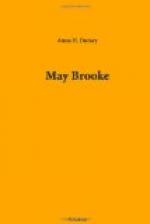“Unworthy—unworthy,” he whispered; then they saw his lips moving in silent and earnest prayer. Dr. Burrell had regarded the whole scene with interest and awe. The whole scene preached to his inmost soul. Doctrinal arguments and learned polemics, he could have tilted with, word for word; but here were facts, and realities and influences, which disarmed and defied all that was skeptical in his nature. The dying man—the priest of God—that young and fragile girl, illustrated by their acts a faith which, though mysterious to him, could be nothing less than divine; but Father Fabian, ignorant of the thoughts which were passing, like ripples of light, through his mind, approached, and asked him in a low voice, “how long he supposed Mr. Stillinghast might linger?”
“He may live until noon to-morrow,” said the doctor.
“He may,” said Father Fabian, “but I fear not, however, God’s holy will be done!”
During the night Mr. Stillinghast’s mind wandered. May, overcome by fatigue, had leaned her head on the bed-side, and fallen into a profound sleep. Helen, timid, and startling at every sound, sat near him, fearing to move, lest it should rouse him.—Her guilty, selfish thoughts, terrified and haunted her like phantoms.
“There are—some papers,” murmured the old man, without turning his head, and thinking he spoke to May, “papers which I wish burnt.”
“Shall I get them, sir?” whispered Helen, while every bad, avaricious, and selfish instinct in her nature, started to sudden life; “where shall I find them?”
“On the second shelf—of the closet—where the wills are. They are records—of sorrows—and bitterness; but be careful, child—those two wills—the last one, which concerns you—is in—a white—envelope; the old one—in a brown wrapper. On the—second shelf; mind—the wills.”




